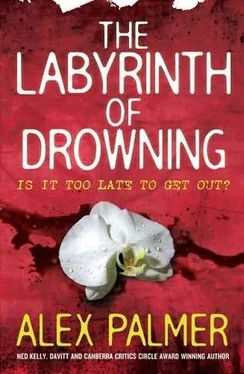Alex Palmer - The Labyrinth of Drowning
Здесь есть возможность читать онлайн «Alex Palmer - The Labyrinth of Drowning» весь текст электронной книги совершенно бесплатно (целиком полную версию без сокращений). В некоторых случаях можно слушать аудио, скачать через торрент в формате fb2 и присутствует краткое содержание. Жанр: Триллер, на английском языке. Описание произведения, (предисловие) а так же отзывы посетителей доступны на портале библиотеки ЛибКат.
- Название:The Labyrinth of Drowning
- Автор:
- Жанр:
- Год:неизвестен
- ISBN:нет данных
- Рейтинг книги:4 / 5. Голосов: 1
-
Избранное:Добавить в избранное
- Отзывы:
-
Ваша оценка:
- 80
- 1
- 2
- 3
- 4
- 5
The Labyrinth of Drowning: краткое содержание, описание и аннотация
Предлагаем к чтению аннотацию, описание, краткое содержание или предисловие (зависит от того, что написал сам автор книги «The Labyrinth of Drowning»). Если вы не нашли необходимую информацию о книге — напишите в комментариях, мы постараемся отыскать её.
The Labyrinth of Drowning — читать онлайн бесплатно полную книгу (весь текст) целиком
Ниже представлен текст книги, разбитый по страницам. Система сохранения места последней прочитанной страницы, позволяет с удобством читать онлайн бесплатно книгу «The Labyrinth of Drowning», без необходимости каждый раз заново искать на чём Вы остановились. Поставьте закладку, и сможете в любой момент перейти на страницу, на которой закончили чтение.
Интервал:
Закладка:
A plea through the media brought mixed results. The bike riders didn’t come forward but a man called Andrew Spence did. A real estate agent, he had been Janice’s latest lover. He had been in the kitchen, making himself a cup of coffee before leaving, when Craig had walked in that Saturday morning. He was adamant that Craig was empty-handed. Janice had still been in bed. Spence had heard about this eighteen-year-old boy but hadn’t met him before. The way Craig had looked at him was so disturbing that Spence had left without drinking his coffee. He hadn’t even said goodbye to Janice who he’d intended to see at least once or twice more. This led to another question. Where was the murder weapon? There’d been no sign of one in the house. If you were going to commit suicide, why bother to conceal it afterwards?
The detective checked with the local high school. Craig’s record there was of a troubled, withdrawn boy who’d made no real friends and whose academic record was a list of failures. He’d left when he was fifteen. Again, there were no photographs. Craig hadn’t liked having his picture taken and it was known he’d go out of his way to avoid it. The year he left school he’d gone to a holiday camp for underprivileged children called Camp Sunshine, run by a private charity. The detective checked with the charity but discovered it had been wound up just recently.
It turned out that Craig had attended only once. The charity forwarded the youth worker’s case notes, which the detective had briefly summarised in his report. Craig was described as a disturbed and disturbing boy. In one serious incident, another boy had woken at night to find him standing over his bed menacing him with a hammer. When the lights had come on, Craig had been unable to stop laughing. The incident was all the more troubling because another of the boys in the dormitory had seen his mother attacked by his father with an iron bar, almost killing her. This boy had told Craig about the incident, which had apparently given him the idea for his joke (as he called it) in the first place. After this, Craig had been sent home. Again, there were no photographs.
According to the neighbours, once Craig had left school, he had spent very little time at home. When he had turned up, he was better dressed than they remembered him being in the past. No one had any idea what he’d been doing with himself. When asked, Janice had brushed off the question with a stock answer: he’s keeping himself busy somehow.
The detective had tracked down Craig’s father, Frank Wells, who lived in Sydney in Brighton-le-Sands. His marriage to Janice had ended ten years earlier. Despite its brutality, the story of the murder left him unmoved. His only comment was that his ex-wife had been a slut and he had no way of knowing whether Craig had been his son in the first place. Why should he care?
At a dead end and having no real evidence to present to the coroner, the detective was forced to let the case go. But it troubled him that there was seemingly nothing in existence that could have identified who Craig Wells had actually been and what he had done in the preceding three years. It seemed that somehow he must have made money. Had he been the source of the cash Janice had used for her dental treatment? If so, why kill her? Or had he been making sure that she would be identified? How to explain Craig’s own teeth? If the body wasn’t Craig’s, how could such an identification be made, unless the substitution of Craig Wells’s identity with somebody else’s had started long before the murder?
The detective brought this puzzle to Harrigan, who had given him a sympathetic hearing. The cold-case team had examined the evidence but there had been nowhere to go with it. Harrigan had respected the detective’s instinct but on the information available there was nothing they could do. The files had gone back to the archives.
Harrigan looked at the pictures of the murder scene: a shabby room in a rented house. Even without a body, the scene had a grimy quality, a sense of thoroughgoing despair. The amount of blood, the bone on the carpet, told a story of cruelty. In contrast to its physical savagery, the story on paper was too neat. He understood the doubts of the first investigating officer. For someone prepared to kill, it would have been possible back then to place a substitute in the front seat of the car and burn the body past recognition. After that, you could disappear and no one would come looking for you. Everything he had read indicated lengthy premeditation, careful planning.
Even if this scenario was accurate, the question still remained: what had made Craig Wells decide to kill in the first place? Other people had drunken, sluttish mothers but didn’t choose to kill them. Harrigan thought, if only briefly, of how he’d not been able to fire a second bullet at his own father. Wouldn’t it have been easier to walk out and never come back? And why should he think this was the same Craig Wells who had used the address of a refugee Somali family to register his car? It was too puzzling a coincidence, particularly with Eddie Grippo and his connections to the Ponticellis prowling in the background. Mohammed Ibrahim’s story of his missing niece was another strange and troubling thread he could not ignore.
Harrigan put the documents back in the box and closed it. He wouldn’t be able to see Toby today as he’d wanted to. It was already time to pick up Ellie.
He went home first and disarmed, locking his gun in its usual place in the safe.
When he got to Kidz Corner, he called on Kate. She met him with a smile.
‘The police sent an officer around,’ she said. ‘A very smart young woman from the police station up at Balmain. She’s my contact. If that car turns up again, I call her right away. She takes it from there. She says she’ll have people down here very quickly.’
‘All under control then,’ he said, relieved. ‘That car may not come back. We may have scared it off for good.’
‘Hope so.’
He went to collect Ellie. She ran to him and he scooped her up. She laughed and put her arms around him.
‘Hello, princess. Did you have a nice day? Of course you did. Come on. Daddy will take you home and Mummy will be there soon.’
After the events of the day, this was a cleaner place to be. He carried his daughter out to his car, relieved to be finished with it all.
8
Grace got home not long after they did. She walked in the door smiling, but her smile was strained and there were lines of tension around her eyes. She went and disarmed, then gave Ellie a hug.
‘Hi, baby. Mummy’s home early. We’re going to have tea soon. How are you? Don’t I love you.’
‘How are you, babe?’ he asked, when he kissed her.
‘Oh, it’s just work,’ she said.
Just work. Given what she did every day, that could have covered just about anything. Something with a nasty kick had happened today, he could tell that, but it might be a long time before he found out what it was.
He kept his information to himself until after Grace had put Ellie to bed. He listened to her singing their daughter to sleep, thought how soft and almost sad her voice sounded at a distance. When she came back down, he had made coffee for her and poured whisky for himself. She smiled at him and sat down. He thought she probably wasn’t aware of how quiet she’d been all night. In the last few hours she had hardly spoken two words to him. She liked to talk: about Ellie, small details of life, gossip about family or friends, particularly hers-the sorority as they called themselves, high-flying female lawyers who worked and partied hard. He had taken her away from that life. ‘Are you bored?’ he’d once asked her. ‘Not yet,’ she’d replied with that arch look she had. ‘I’m happy,’ she’d added. ‘I never expected to be that.’ Why did he always feel that doubt, that she might not be? All those years he’d spent on his own; the impress of that loneliness was still there and still strong.
Читать дальшеИнтервал:
Закладка:
Похожие книги на «The Labyrinth of Drowning»
Представляем Вашему вниманию похожие книги на «The Labyrinth of Drowning» списком для выбора. Мы отобрали схожую по названию и смыслу литературу в надежде предоставить читателям больше вариантов отыскать новые, интересные, ещё непрочитанные произведения.
Обсуждение, отзывы о книге «The Labyrinth of Drowning» и просто собственные мнения читателей. Оставьте ваши комментарии, напишите, что Вы думаете о произведении, его смысле или главных героях. Укажите что конкретно понравилось, а что нет, и почему Вы так считаете.












